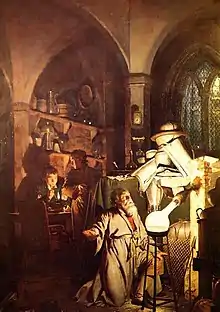philosopher's stone
English

The Alchemist in Search of the Philosopher’s Stone by Joseph Wright (1771)
Etymology
philosopher + -'s + stone.
Alternative forms
- philosophers' stone
- philosophers stone
- stone of the philosophers
Noun
the philosopher's stone (countable and uncountable, plural philosopher's stones)
- (alchemy, uncountable) A supposed substance able to turn base metals, such as lead or mercury, into gold or silver, also sometimes claimed to cure any illness (as panacea) or confer immortality (as elixir of life), among other functions;
(countable) a piece composed of said substance.- 1997, Christopher McIntosh, The Rosicrucians: The History, Mythology, and Rituals of an Esoteric Order, Weiser Books, 3rd Revised Edition, 1998, Paperback, page 51,
- The Rosicrucianism of the Andreae era was only partly concerned with alchemy, but later revivals of the Rosicrucian idea were to lay great stress on their claims to possess the secrets of transmutation and the knowledge of the Philosopher's Stone or the Elixir of Life.
- 2003, Richard Myers, The Basics of Chemistry, Greenwood Publishing Group (Greenwood Press), page 11,
- The alchemists were crafts people who combined serious experimentation with astrology, incantations, and magic in hopes of finding the philosopher's stone.
- The philosopher's stone or material prima was a substance (a powder, tincture, or stone) that was more pure than gold itself. It was thought that by using a minute quantity of the philosopher's stone a base metal could be elevated to gold through an alchemical process. Besides perfecting common substances into gold, the philosopher's stone was thought to convey immortality, cure all common ills, and cleanse the spiritual soul.
- 2003, Stanton J. Linden, The Alchemy Reader: From Hermes Trismegistus to Isaac Newton, Cambridge University Press, page 44,
- The Cleopatra of this early alchemical dialogue is not the famous Cleopatra VII (69-30 BC), last queen of the Ptolemy dynasty and lover of Mark Antony. Along with Mary Prophetess and Zosimos's Theosebia, this Cleopatra occupies a high place in alchemical lore as one of very few ancient female adepts who possessed the secret of the philosopher's stone.
- 1997, Christopher McIntosh, The Rosicrucians: The History, Mythology, and Rituals of an Esoteric Order, Weiser Books, 3rd Revised Edition, 1998, Paperback, page 51,
Usage notes
- Often capitalised.
- The form philosopher's stone is most common, although philosophers' stone is arguably more precise.
Synonyms
- (putative substance able to turn base metals into gold): sorcerer's stone (US English)
- For more see:

Translations
philosopher's stone
|
|
Further reading



This article is issued from Wiktionary. The text is licensed under Creative Commons - Attribution - Sharealike. Additional terms may apply for the media files.